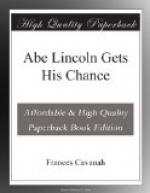Senator Douglas was an eloquent orator. While he was talking, some of Abe’s friends would worry. Would Old Abe be able to answer? Would he be able to hold his own? Then Abe would unfold his long legs and stand up. “The Giant Killer” towered so high above “the Little Giant” that a titter ran through the crowd.
When he came to the serious part of his speech, there was silence. His voice reached to the farthest corners of the crowd, as he reminded them what slavery really meant. He summed it up in a few words: “You work and toil and earn bread, and I’ll eat it.”
Both men worked hard to be elected. And Douglas won. “I feel like the boy,” said Abe, “who stubbed his toe. It hurts too bad to laugh, and I am too big to cry.”
All of those who loved him—Mary, his wife, in her neat white house; Sarah, his stepmother, in her little cabin, more than a hundred miles away; and his many friends—were disappointed. But not for long. The part he took in the Lincoln-Douglas debates made his name known throughout the United States.
Abe Lincoln’s chance was coming.
15
[Illustration]
During the next two years Abraham Lincoln was asked to make many speeches. “Let us have faith that right makes might,” he told one audience in New York, “and in that faith let us, to the end, dare to do our duty as we understand it.”
At the end of the speech, several thousand people rose to their feet, cheering and waving their handkerchiefs. His words were printed in newspapers. Throughout the Northern States, men and women began to think of him as the friend of freedom.
By 1860 he was so well known that he was nominated for President of the United States. Stephen A. Douglas was nominated by another political party. Once more the two rivals were running for the same office.
Several thousands of Abraham Lincoln’s admirers called themselves “Wide Awakes.” There were Wide Awake Clubs in near every Northern town. Night after night they marched in parades, carrying flaming torches and colored lanterns. And as they marched, they sang:
“Hurrah! for our cause—of
all causes the best!
Hurrah! for Old Abe, Honest Abe
of the West.”
No one enjoyed the campaign excitement more than did Willie and Tad Lincoln. They did their marching around the parlor carpet, singing another song:
“Old Abe Lincoln came out of the
wilderness,
Out of the wilderness, out of the
wilderness,
Old Abe Lincoln came out of the
wilderness,
Down in Illinois.”
People everywhere were talking about Old Abe, and he received a great deal of mail. Some of the letters came from Pigeon Creek. Nat Grigsby, his old schoolmate, wrote that his Indiana friends were thinking of him. Dave Turnham wrote. It was in Dave’s book that Abe had first read the Declaration of Independence. A package arrived from Josiah Crawford who had given him his Life of Washington. The package contained a piece of white oak wood. It was part of a rail that Abe had split when he was sixteen years old. Josiah thought that he might like to have it made into a cane.




